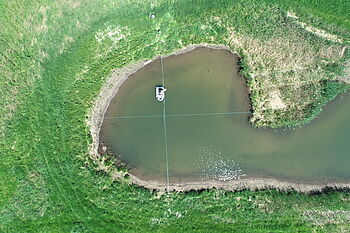Inhalt: Project details
Duration
10.2022 – 11.2025
Contact person
- Dr. Marlen Heinz (ÖPV)
Tel: +49 (0)30 8304 2385
marlen.heinz@julius-kuehn.de
- Dr. Corinna Borchard (ÖPV)
Tel: +49 (0)30 8304 2313
corinna.borchard@julius-kuehn.de
JKI Project team
Institute for Ecological
Chemistry, Plant Analysis and Stored Product Protection (ÖPV)
Project partner
- Gut & Boesel (Farm of Finck Stiftung gGmbH)
The project "WAKS" is funded by the Federal Ministry of Food and Agriculture as part of the German Climate Protection Programme 2022.
Inhalt: Rewetting of agricultural water bodies as an emergency climate protection measure - Scientific evaluation and impact assessment for the agricultural landscape (WAKS)
Background:
The German agricultural landscape is endowed with countless standing small water bodies. Climate change will lead to more frequent and prolonged drying out of more and more small water bodies due to longer and warmer dry periods. In particular, areas of water that are only temporarily flooded will emit significantly more CO2 than permanently flooded areas due to increased decomposition of organic matter in the sediment. Small water bodies thus become sources of greenhouse gases.
Objectives:
The WAKS project investigates the removal of organic-rich sediment (desilting) from small water bodies in the agricultural landscape as a measure to mitigate CO2 emissions and evaluates the CO2 reduction potential. Desilting is expected to lead to an increase in the duration of flooding and an increase in floodplain area, resulting in a reduction in CO2 emissions. The expected effects will be investigated by regular in situ measurements of CO2 emissions in a measure and a reference water body. Spatial patterns of increased CO2 release ("hot spots") as well as seasonal dynamics ("hot moments") will be determined. The results will be used to develop recommendations for agricultural practice.
The project corresponds the requirements of the amended climate protection law (§3a, printed matter 19/30230 of the German Bundestag), which calls for "securing" the "CO2 binding effect" of agricultural ecosystems. At the same time, rewetted small water bodies contribute to the protection and restoration of biodiversity by reversing habitat losses due to desiccation. In this way, the project also serves the goals of the Arable Farming Strategy 2035, the National Strategy on Biological Diversity and the Insect Conservation Action Program.

